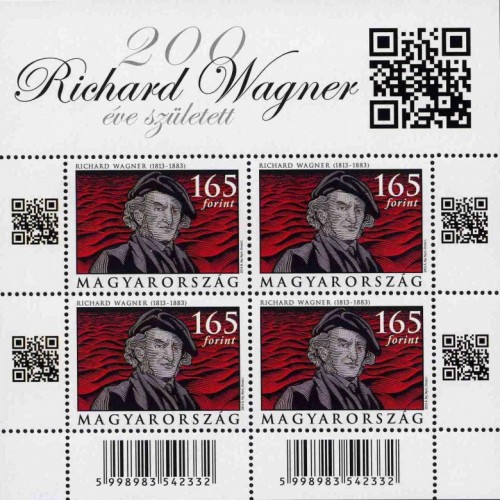
1. MAGYAR - 200 ÉVE SZÜLETETT GIUSEPPE VERDI ÉS RICHARD WAGNER - Bélyeg rendelés >>
2. ENGLISH - BICENTENARY OF THE BIRTH OF RICHARD WAGNER AND GIUSEPPE VERDI - Order stamp >>
3. GERMAN - 200. Geburtstag von Richard Wagner und Giuseppe Verdi - Die Bestellnummer Der Marke >>
1. MAGYAR - 200 ÉVE SZÜLETETT GIUSEPPE VERDI ÉS RICHARD WAGNER
Richard Wagner és Giuseppe Verdi születésének 200. évfordulója tiszteletére „hangos” bélyeget hoz forgalomba a Magyar Posta
A kibocsátás attól különleges, hogy magyar postabélyegen most első alkalommal jelenik meg úgynevezett QR-kód. Okostelefon és internet segítségével a Magyar Állami Operaház honlapján található hangzó és olvasható bicentenáriumi információkat érhetik el az érdeklődők. A bélyegkép középpontjában a portrék, a háttérben a zeneszerzők – A Rajna kincse illetve az Aida – műveire utaló grafikai kompozíciók láthatók. A bélyegkisívek Orosz István Kossuth-díjas grafikusművész tervei szerint 50 ezer példányban az ANY Biztonsági Nyomdában készültek.
Wilhelm Richard Wagner (Lipcse, 1813. május 22. – Velence, 1883. február 13.) német zeneszerző, karmester, esztéta, a német opera megreformálója. Rendszeres zeneoktatásban sohasem részesült, a legfontosabbakat Theodor Weinlingtől, a lipcsei Tamás-templom karnagyától sajátította el. Zeneszerzőként operái tették halhatatlanná, bár számos más területen is alkotott (színpadi kísérőzenék, zenekari-, kamarazenei- és kórusművek, dalok, áriák, zongoradarabok, -átiratok és hangszerelések). Zenéjének a Gesamtkunstwerk (szöveg, zene és színpadi cselekmény elválaszthatatlan egysége), a vezérmotívum-technika következetes alkalmazása, a végtelen dallam, és a deklamáló stílusú énekbeszéd a jellemzője.
Giuseppe Fortunino Francesco Verdi (Le Roncole, 1813. október 10. – Milánó, 1901. január 27.) az egyik leghíresebb 19. századi olasz zeneszerző, az opera kimagasló egyénisége. Művészetének fejlődése Rossini, Bellini, Donizetti művészetéből ágazott ki, áttörte korának bel canto kliséit, és a zenedráma szolgálatába állította az éneket. Korabeli kritikusai éppen emiatt zenéjét gyakran nyersnek, csiszolatlannak minősítették. Hatása óriási, a századforduló olasz operaszerző nemzedékére, Puccinire és kortársaira gyakorolt közvetlen hatásán túl erősen hatott az opera 20. századi fejlődésére is. Műveit ma is nagy sikerrel játsszák világszerte, és néhány részletük igazi slágerré vált. (F: hu.wikipedia.org)
Forrás: Posta
2. ENGLISH - BICENTENARY OF THE BIRTH OF RICHARD WAGNER AND GIUSEPPE VERDI
Magyar Posta is releasing “audible” postage stamps to mark the 200th anniversary of the birth of Richard Wagner and Giuseppe Verdi. The release is unusual because this is the first time that a QR code has appeared on Hungarian postage stamps. With a smart phone and the Internet information about the bicentenary on the Hungarian State Opera House’s web site can be heard and read. Portraits of the composers are at the centre of the stamp designs, while graphic compositions referring to works by them (Das Rheingold and Aida) are in the background. Fifty thousand copies of the miniature sheets designed by the Kossuth Prize-winning graphic artist István Orosz were printed by the ANY Security Printing Company.
Wilhelm Richard Wagner (Leipzig, 22 May 1813 – Venice, 13 February 1883) was a German composer, conductor, aesthete and reformer of German opera. Wagner did not have a regular musical education, and learnt the most important aspects of composition from Theodor Weinling, the choirmaster at St Thomas’ church in Leipzig. His operas have assured his immortality as a composer, but he composed works in several other areas (incidental theatre, orchestral and chamber music, choral works, songs, arias, piano pieces, transcription and orchestration). His music is typified by the concept of Gesamtkunstwerk (a total work fusing music, the libretto and drama) and the use of leitmotifs, endless melody and sprechgesang.
Giuseppe Fortunino Francesco Verdi (Le Roncole, 10 October 1813 – Milan, 27 January 1901) was one of the most famous 19th-century Italian composers and an outstanding figure in opera. His work diverged from the works of Rossini, Bellini and Donizetti, breaking away from bel canto clichés and making song serve musical drama. For precisely this reason contemporary critics frequently considered his music raw and unpolished. His influence was immense, both on the generation of fin-de-siècle Italian opera composers, directly affecting Puccini and his contemporaries, and on the development of 20th-century opera. His works still enjoy great success today worldwide and some of his themes have become much loved favourites. (Source: hu.wikipedia.org)
3. GERMAN - 200. Geburtstag von Richard Wagner und Giuseppe Verdi
Die Magyar Posta bringt zu Ehren des 200. Geburtstages von Richard Wagner und Giuseppe Verdi eine interaktive Briefmarke auf den Markt. Die Besonderheit der Briefmarkenausgabe besteht darin, dass jetzt zum ersten Mal ein so genannter QR-Code auf einer ungarischen Briefmarke erscheint. Die Briefmarken- und Musik-Fans können mit Hilfe des Codes und eines Smartphones auf der Website der Ungarischen Staatsoper hör- und lesbare Informationen über den 200. Jahrestag abrufen. In der Mitte der Briefmarken sind die Porträts, im Hintergrund grafische Kompositionen zu sehen, die auf die Werke – Das Rheingold bzw. Aida – der Komponisten hindeuten. Die Briefmarkenkleinbogen wurden nach Entwürfen des Grafikers und Kossuthpreisträgers István Orosz in 50 000 Exemplaren in der ANY Biztonsági Nyomda (ANY Sicherheitsdruckerei) hergestellt.
Wilhelm Richard Wagner (* 22. Mai 1813 in Leipzig; † 13. Februar 1883 in Venedig) war ein deutscher Komponist, Dirigent, Ästhet und Erneuerer der deutschen Oper. Er absolvierte nie ein regelmäßiges Musikstudium, nahm jedoch Kompositionsunterricht beim Thomaskantor Theodor Weinlig in Leipzig. Seine Opern machten ihn als Komponisten unsterblich, obgleich er auch in vielen anderen Bereichen tätig war (Bühnenmusik, Orchester- und Kammermusik, Chorwerke, Lieder, Arien, Klavierstücke und -transkriptionen sowie Orchestrierungen). Merkmale seiner Musik sind das Gesamtkunstwerk (untrennbare Einheit von Text, Musik und Bühnenakt), die konsequente Anwendung der Leitmotivtechnik, die unendliche Melodie und der Sprechgesang im deklamatorischen Stil.
Giuseppe Fortunino Francesco Verdi (* 10. Oktober 1813 in Le Roncole; † 27. Januar 1901 in Mailand) war einer der berühmtesten italienischen Komponisten des 19. Jahrhunderts, der vor allem durch seine Opern berühmt wurde. Verdi knüpfte an die Leistungen von Rossini, Bellini, Donizetti an, durchbrach die Klischees der Belcanto-Ära und stellte den Gesang in die Dienste des Musikdramas. Zeitgenössische Kritiker bezeichneten seine Musik aus diesem Grund oft als rau und ungeschliffen. Sie hatte eine enorme Wirkung auf die Generation der italienischen Opernkomponisten der Jahrhundertwende. Außer der direkten Wirkung auf Puccini und seine Zeitgenossen beeinflusste sie indirekt auch die Entwicklung der Oper des 20. Jahrhunderts. Seine Werke werden auch heute mit großem Erfolg weltweit gespielt und einige Stücke sind mittlerweile echte Hits geworden. (Quelle: hu.wikipedia.org)










